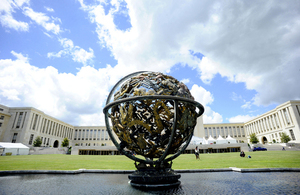Human Rights Council 34: Joint statement under Item 6 (Universal Periodic Review)
This joint statement was delivered during the discussion on the Universal Periodic Review process at the 34th session of the Human Rights Council on 17 March 2017.

The Human Rights Council takes place at the Palais des Nations in Geneva
I have the honour to make this statement on behalf of Brazil, Morocco, Paraguay, the United Kingdom, and a total of 63 countries.
As we prepare for the third UPR cycle, we must reflect on both its successes and challenges. It has twice achieved 100% participation from all UN Member States, and it has succeeded in involving all relevant stakeholders at all stages. The UPR represents a combination of the spirit of international cooperation among States in the field of human rights, as well as national ownership. We welcome the positive change that the UPR helps to promote, through the impact of its recommendations and also by virtue of its multi-stakeholder process.
Looking towards the third cycle, we believe it is time to focus on the sustainable implementation of recommendations. We welcome Council resolution 30/25 on ‘Promoting international cooperation to support national human rights follow-up systems and processes’. We consider that all States share a common responsibility to ensure the success of the third cycle and its impact on the ground. To this end, we wish to highlight five points:
-
First, while we are pleased that the quality of recommendations has improved throughout the second cycle, many remain imprecise, which hampers their implementation. We reaffirm our commitment to ensure that all our recommendations are precise, practical, constructive, forward looking and implementable.
-
Second, a corollary responsibility rests with the States under Review to provide a clear response to each recommendation. As indicated in Article 32 of the IB package, recommendations are to be either “supported” or “noted”. We will strive to keep to this agreed-upon terminology, and avoid other categories of response.
-
Third, with a view to enhancing the visibility, coherence and implementation of recommendations in the third cycle, we commit to continue exercising restraint on the number of recommendations given to other states.
-
Fourth, a number of challenges remain with implementation of recommendations by States under Review. We believe that technical assistance has an important role to play in helping states to implement their accepted recommendations. We recall the importance of the UPR Trust Fund for the implementation of recommendations in this regard. Furthermore, we commit to providing an update on progress achieved in the implementation of our recommendations two and a half years after our reviews through writing and publishing a Mid Term Report, or through another alternative process. In this vein, we welcome the fact that some States have provided oral updates on UPR implementation in the General Debate under Item 6 and encourage broader use of this practice.
-
Fifth, the approach to follow up to recommendations is not yet systemic. We commit to improving follow-up on the recommendations we made to other States at the previous cycle, including by referring to, or reiterating previous recommendations when appropriate.